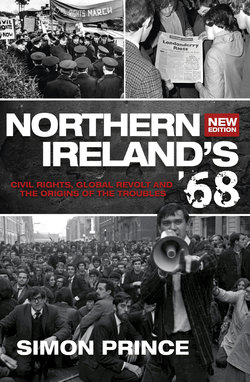Читать книгу Northern Ireland’s ’68 - Simon Prince - Страница 8
На сайте Литреса книга снята с продажи.
ОглавлениеDramatis Personae
Ken Bloomfield: Terence O’Neill’s closest civil service adviser and his speechwriter.
Kevin Boyle: A popular young lecturer at Queen’s University who was elected onto the Faceless Committee of People’s Democracy.
Sir Basil Brooke (Viscount Brookeborough): Prime Minister of Northern Ireland from 1943 to 1963.
Paddy Byrne: Secretary of the Campaign for Democracy in Ulster.
Stokley Carmichael: American civil rights activist and Chair of the Student Non-violent Co-ordinating Committee.
Daniel Cohn-Bendit: The star of France’s ’68.
Ivan Cooper: Chair of the Derry Citizens’ Action Committee.
Anthony Coughlan: Independent thinker who built upon C. Desmond Greaves’s ideas to construct the Republican movement’s civil rights strategy.
Bill Craig: Unionist politician who was initially a close ally of Terence O’Neill, but later became one of his chief rivals.
Sir James Craig (Viscount Craigavon): Northern Ireland’s first Prime Minister (1921–40).
Austin Currie: Nationalist MP for East Tyrone from 1964 to 1972 and one of the organisers of the first civil rights march.
Bernadette Devlin: Queen’s University student who was elected onto the Faceless Committee of People’s Democracy and became the star of the civil rights movement.
Finbar Doherty: One of the Derry radicals. After the 5 October 1968 march, which he helped to organise, he agreed to join the Derry Citizens’ Action Committee.
James Doherty: Nationalist councillor on Londonderry Corporation and Eddie McAteer’s chief lieutenant.
Paddy Doherty: One of the leaders of Derry’s self-help movement and the man in charge of stewarding protests in the city during the civil rights crisis.
Rudi Dutschke: The public face of West Germany’s Extra- Parliamentary Opposition.
Michael Farrell: One of Northern Ireland’s leading leftists and a hugely influential figure within People’s Democracy.
Brian Faulkner: The second man in Terence O’Neill’s government – but he entertained hopes that the premiership would soon be his.
Gerry Fitt: Republican Labour politician who was elected to both Stormont and Westminster during the 1960s. As the civil rights campaign developed, he began to challenge for the political leadership of the minority population.
Frank Gogarty: A key member of the Belfast Wolfe Tone Society and of the Northern Ireland Civil Rights Association.
Cathal Goulding: The Irish Republican Army’s Chief of Staff from 1962.
C. Desmond Greaves: The Communist Party of Great Britain’s Irish expert and the dominant figure within the Connolly Association – which pioneered many of the tactics used in the civil rights campaign.
Cahir Healy: Veteran Nationalist politician.
John Hume: Community activist and Vice-Chair of the Derry Citizens’ Action Committee.
Roy Johnston: Socialist intellectual who searched for a political home first in the Communist Party, then in the Connolly Association, and finally in the Republican movement.
Séan Lemass: Veteran of the Irish Revolution and Taoiseach from 1959.
Eddie McAteer: Nationalist MP for Derry’s Foyle constituency from 1953 to 1969 and party leader from 1964.
Eamonn McCann: One of Northern Ireland’s leading leftists and organiser of Derry’s first civil rights march.
Conn and Patricia McCluskey: Civil Rights activists who helped to lead the Homeless Citizens’ League, the Campaign for Social Justice, and the Northern Ireland Civil Rights Association.
Eamon Melaugh: One of the Derry radicals. Following the 5 October 1968 march, he too became a member of the Derry Citizens’ Action Committee.
Séan MacStiofain: Traditionalist Republican who opposed Cathal Goulding’s turn to the left.
Terence O’Neill: Prime Minister of Northern Ireland from 1963 to 1969.
Ian Paisley: Pastor and politician who strongly resisted any liberalisation of the Protestant Churches and the Northern Irish state.
Betty Sinclair: Veteran Communist and Chair of the Northern Ireland Civil Rights Association.
Cyril Toman: A close comrade of Eamonn McCann and Michael Farrell.
Eamon de Valera: The most important politician in the history of modern Ireland. De Valera served for long spells as both Taoiseach (1932–48, 1951–4 and 1957–9) and President (1959–73).
